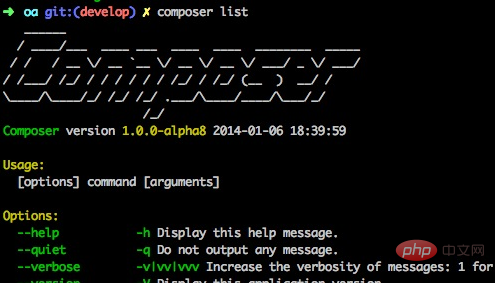How to manage PHP dependencies using Composer
Composer is a dependency management tool for PHP, so how to use Composer to manage PHP dependencies? Next, the composer usage tutorial column will explain how to use Composer to manage PHP dependencies.

Composer is a tool used in PHP to manage dependency relationships. You can declare the external libraries (libraries) you depend on in your project, and Composer will install these dependent library files for you.
System requirements:
Composer requires PHP5.3.2 or above to run. There are several sensitive PHP settings and compilation flags that are also required, but the installer will issue a warning when any incompatibilities exist. For example, the requirement for PHP extensions is to install or recompile php without –disable-phar
Composer is compatible with multiple platforms, and its operation is suitable for Windows, Linux and OSX.
This command will download composer.phar to the current directory.
Java Code
curl -sS https://getcomposer.org/installer | php
You can use the --install-dir option to install Composer to a specified directory, for example:
Java Code
curl -sS https://getcomposer.org/installer | php -- --install-dir=bin
Of course You can also install it globally:
Java code
curl -sS https://getcomposer.org/installer | php mv composer.phar /usr/local/bin/composer
OSX installation (non-global)
Java code
brew tap josegonzalez/homebrew-php brew install josegonzalez/php/composer
But usually you only need to install composer Just add the location of .phar to the PATH environment variable, it doesn't have to be installed globally. After the installation is complete, check the installed version.

Composer China Mirror
Using this mirror service means that all downloaded installation package metadata will come from this mirror service instead of making requests to packagist.org. This will speed up the Composer installation process and make it more reliable and faster. (Due to well-known reasons, the connection speed of foreign websites is too slow and may be blocked at any time)
Generally, the installation package data (zip files, etc.) are generally downloaded from GitHub or other third-party servers Yes, after using this mirror service, we will cache all installation packages to the domestic computer room, so that we no longer have to make requests to foreign websites. Therefore, even if packagist.org, github.com or other third-party services fail (mainly The connection speed is too slow or blocked), you can still download and update the installation package.
Enable this mirror service: Add the following configuration information to the Composer configuration file config.json (system global configuration)
View the composer home directory: You can use the composer config -l -g command List the global configuration information of composer, and search for the [home] configuration item in this information, which is the home directory of composer. Linux users please execute the sudo composer config -l -g command.
Enter the composer's home directory, open the config.json file (if it doesn't exist, create one yourself), and then add the configuration information of this mirror service. The final content is as follows:
Java code
{
"config": {
},
"repositories": [
{"type": "composer", "url": "http://pkg.phpcomposer.com/repo/packagist/"},
{"packagist": false}
]
}Declare dependencies
Create a composer.json file in the project directory and specify the dependencies. For example, your project depends on monolog: Add the Chinese mirror configuration information to your project In the composer.json file (configured for a single project)
Java code
{
"require": {
"monolog/monolog": "1.2.*"
}
/*"repositories": [
{"type": "composer", "url": "http://pkg.phpcomposer.com/repo/packagist/"},
{"packagist": false}
]*/
}
Installation dependencies
Installation dependencies are very Simple, just run in the project directory:
Java code
composer install composer update
If there is no global installation, run:
Java code
php composer.phar install
Automatic loading
Composer provides the feature of automatic loading. Just add the following line to the initialization part of your code:
Java code
require 'vendor/autoload.php';
Successful download and installation interface

Composer is a dependency management tool in PHP. Through Composer we can save a lot of files and control the versions of dependent packages when publishing software.
Composer中文网:http://www.phpcomposer.com/ Composer Github项目:https://github.com/composer/composer PHP Composer软件包列表:https://packagist.org/
The above is the detailed content of How to manage PHP dependencies using Composer. For more information, please follow other related articles on the PHP Chinese website!

Hot AI Tools

Undresser.AI Undress
AI-powered app for creating realistic nude photos

AI Clothes Remover
Online AI tool for removing clothes from photos.

Undress AI Tool
Undress images for free

Clothoff.io
AI clothes remover

Video Face Swap
Swap faces in any video effortlessly with our completely free AI face swap tool!

Hot Article

Hot Tools

Notepad++7.3.1
Easy-to-use and free code editor

SublimeText3 Chinese version
Chinese version, very easy to use

Zend Studio 13.0.1
Powerful PHP integrated development environment

Dreamweaver CS6
Visual web development tools

SublimeText3 Mac version
God-level code editing software (SublimeText3)

Hot Topics
 1386
1386
 52
52
 Solve caching issues in Craft CMS: Using wiejeben/craft-laravel-mix plug-in
Apr 18, 2025 am 09:24 AM
Solve caching issues in Craft CMS: Using wiejeben/craft-laravel-mix plug-in
Apr 18, 2025 am 09:24 AM
When developing websites using CraftCMS, you often encounter resource file caching problems, especially when you frequently update CSS and JavaScript files, old versions of files may still be cached by the browser, causing users to not see the latest changes in time. This problem not only affects the user experience, but also increases the difficulty of development and debugging. Recently, I encountered similar troubles in my project, and after some exploration, I found the plugin wiejeben/craft-laravel-mix, which perfectly solved my caching problem.
 Use Composer to solve dependency injection: application of PSR-11 container interface
Apr 18, 2025 am 07:39 AM
Use Composer to solve dependency injection: application of PSR-11 container interface
Apr 18, 2025 am 07:39 AM
I encountered a common but tricky problem when developing a large PHP project: how to effectively manage and inject dependencies. Initially, I tried using global variables and manual injection, but this not only increased the complexity of the code, it also easily led to errors. Finally, I successfully solved this problem by using the PSR-11 container interface and with the power of Composer.
 How to solve the problem of JavaScript error handling using Composer
Apr 18, 2025 am 08:30 AM
How to solve the problem of JavaScript error handling using Composer
Apr 18, 2025 am 08:30 AM
I'm having a tough problem when developing a complex web application: how to effectively handle JavaScript errors and log them. I tried several methods, but none of them could meet my needs until I discovered the library dvasilenko/alterego_tools. I easily solved this problem through the installation of this library through Composer and greatly improved the maintainability and stability of the project. Composer can be learned through the following address: Learning address
 How to quickly build LaravelCMS with Composer: mki-labs/espresso practical experience
Apr 18, 2025 am 07:36 AM
How to quickly build LaravelCMS with Composer: mki-labs/espresso practical experience
Apr 18, 2025 am 07:36 AM
I encountered a tricky problem when developing a new Laravel project: how to quickly build a fully functional and easy-to-manage content management system (CMS). I tried multiple solutions, but all gave up because of complex configuration and inconvenient maintenance. Until I discovered the LaravelCMS package mki-labs/espresso, which not only simple to install, but also provides powerful functions and intuitive management interface, which completely solved my problem.
 How to use Composer to solve the problem of batch processing of data under Yii framework
Apr 18, 2025 am 07:54 AM
How to use Composer to solve the problem of batch processing of data under Yii framework
Apr 18, 2025 am 07:54 AM
When developing Yii framework projects, you often encounter situations where you need to obtain a large amount of data from the database. If appropriate measures are not taken, directly obtaining all data may cause memory overflow and affect program performance. Recently, when I was dealing with a project on a large e-commerce platform, I encountered this problem. After some research and trial, I finally solved the problem through the extension library of pavle/yii-batch-result.
 How to resolve HTTP request issues using Composer: A practical guide to the yiche/http library
Apr 18, 2025 am 08:06 AM
How to resolve HTTP request issues using Composer: A practical guide to the yiche/http library
Apr 18, 2025 am 08:06 AM
During development, HTTP requests are often required, which may be to get data, send data, or interact with external APIs. However, when faced with complex network environments and changing request requirements, how to efficiently handle HTTP requests becomes a challenge. I have encountered a problem in a project: I need to send requests to different APIs frequently, and log the requests to facilitate subsequent debugging and analysis. After trying several methods, I discovered the yiche/http library. It not only simplifies the processing of HTTP requests, but also provides dynamic logging functions, greatly improving development efficiency.
 How to use Composer to improve the security of Laravel applications: Applications of wiebenieuwenhuis/laravel-2fa library
Apr 18, 2025 am 11:36 AM
How to use Composer to improve the security of Laravel applications: Applications of wiebenieuwenhuis/laravel-2fa library
Apr 18, 2025 am 11:36 AM
When developing a Laravel application, I encountered a common but difficult problem: how to improve the security of user accounts. With the increasing complexity of cyber attacks, a single password protection is no longer enough to ensure the security of users' data. I tried several methods, but the results were not satisfactory. Finally, I installed the wiebenieuwenhuis/laravel-2fa library through Composer and successfully added two-factor authentication (2FA) to my application, greatly improving security.
 Laravel framework installation method
Apr 18, 2025 pm 12:54 PM
Laravel framework installation method
Apr 18, 2025 pm 12:54 PM
Article summary: This article provides detailed step-by-step instructions to guide readers on how to easily install the Laravel framework. Laravel is a powerful PHP framework that speeds up the development process of web applications. This tutorial covers the installation process from system requirements to configuring databases and setting up routing. By following these steps, readers can quickly and efficiently lay a solid foundation for their Laravel project.




